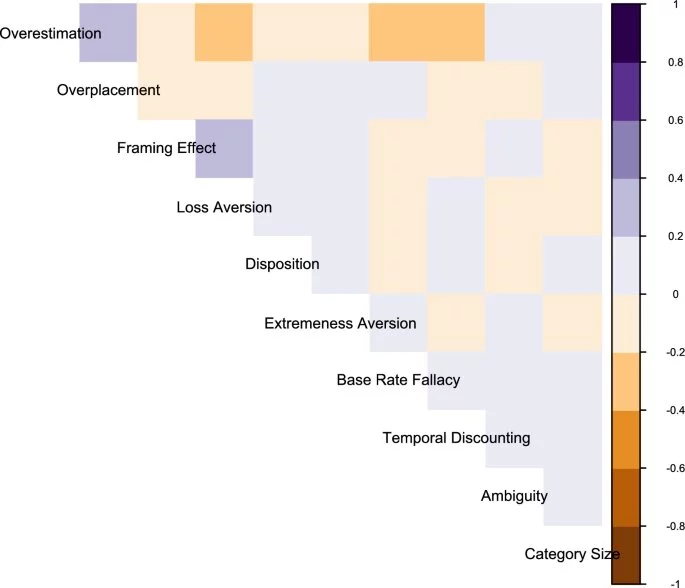A global study led by a researcher at Columbia University Mailman School of Public Health and published in the journal Scientific Reports finds that economic inequality on a social level cannot be explained by bad choices among the poor nor by good decisions among the rich. Poor decisions were the same across all income groups, including for people who have overcome poverty.
Study here: https://www.nature.com/articles/s41598-023-36339-2
The title of this article is /r/Politics levels of editorialising. I half expected to read, “our conclusion is that conservatives are clearly dumber.”
The study used some simple tests to measure certain cognitive biases respondents might possess. Unsurprisingly, poor people are human, and subject to the same amount of bias as everyone else. This doesn’t test the title of this submission - choices - at all. In fact the authors go to great lengths to explain this:
“Our research does not reject the notion that individual behavior and decision-making may directly relate to upward economic mobility. Instead, we narrowly conclude that biased decision-making does not alone explain a significant proportion of population-level economic inequality,” says first author Kai Ruggeri, Ph.D., assistant professor in the Department of Health Policy and Management at Columbia Public Health.
Sorry but how does the title not just slightly rephrase the paragraph you quoted? Seems like Kai Ruggeri is saying that their study concluded that poor people making poor choices is not a sole explanation for economic inequality.
It’s completely different. Everyone has cognitive biases, so measuring whether the poor have more cognitive biases or less doesn’t mean anything except that they have the same cognitive biases as anyone else.
That doesn’t speak to the quality of their decisions. The idea that you can’t make your life better or worse by the decisions that you make is self-evidently wrong. The only way that you could think that you can’t make your life better or worse by making better or worse decisions it’s if you’ve never made a decision that had any consequence.
You can share the same cognitive biases as everyone else and still make better or worse decisions. As a general rule, people who practice self control and defer gratification are going to do better than people who do not practice self-control and do not defer gratification. Of course it’s not always true, sometimes you roll a one. But in general, we know that certain types of decisions are going to have better outcomes and other types of decisions are going to have worse outcomes.
Sometimes the exact same cognitive biases can justify polar opposite ends. For example, optimism bias could play out in such a way that somebody makes incredibly poor decisions and justifies it thinking that everything will be okay anyway. On the other hand, the same optimism bias could play out in such a way that somebody makes better decisions and justifies it thinking that if they do everything they need to then everything’s going to be okay. Both ways could turn out to be wrong.
Yet another bias that we have is neglect of probability. Somebody who makes good decisions or somebody who makes bad decisions could use the exact same faulty logic that doing what they were going to do has a chance of helping them become a billionaire. In both cases, the chances of becoming a billionaire are infinitesimal, but the cognitive bias can justify both positions. Hang on to that piece of information for a minute it becomes important later.
One of the most studied cognitive biases is anchoring bias. In this cognitive bias, a recent piece of information ends up coloring the decisions that are made. Depending on what the last piece of news that you heard was, the cognitive biases that you have may end up supporting the idea of doing the right things, or they may end up supporting the ideas of doing the wrong things, and it’s almost random what the last thing that you heard was.
I could go on listing different cognitive biases and how they can potentially affect our judgments, and all of them would be true. But what would not be true is that the decision that you make doesn’t matter. The decisions that you make matter more than anything. That’s why if you want to have a good life, and you had a choice between being a couple standard deviations above average and intelligence or being a couple standard deviations above average in wealth, you would choose intelligence because it would help you make better decisions that would lead to better outcomes than just having a bunch of wealth available for you to blow.
That was a lot of words to not actually address what I said.
It directly addresses what you said. The study investigates cognitive biases, and the title talks about “poor decisions”. The two are completely different things, as I explained in depth.
I’m wondering if there is any research which directly addresses the correlation level between cognitive biases and poor decisionmaking.
It feels like commonsense that there should be a causal relationship in there, logically speaking, but “common sense” isn’t science.
The association between the cognitive biases of the tested psycho-metrics and poor decision making with regards to socio-economic outcomes aren’t tested or even cited in the study. To draw a causal conclusion you would need to investigate and confirm that. Put simply, A does not imply B.
Does this mean r/Politics is in stage 4?
While online surveys seem like not the best method this is interesting. I would love to see more studies like this. It’s really hard to show systemic problems and people have a really hard time believing that this exists since they can find anecdotal examples to the contrary
people have a really hard time believing that this exists since they can find anecdotal examples to the contrary
“I once met someone who rolled a 12 with 2 dice. Why did those other people not choose to roll better than a 7 on average? Must be because of bad decisions.”
I once met someone who rolled a 12 with 2 dice. Why did those other people not choose to roll better than a 7 on average? Must be because of bad decisions.
This same person rolled a 12 twice. Everyone else is an idiot. Just roll out good
I knew a guy whose grandparents rolled three 12s in a row, now he keeps knocking the die off the table, but is allowed to do it again and again because of the good choices of his grandparents.
Meanwhile these people are rolling d20’s while the average person is lucky to have a d4 and a d6
There’s a great analogy that I was introduced to a while back,
Life is like a carnival dart throw game.
Middle class kids get one throw. Most hit the board somewhere in the “doing okay” region, some miss the board completely, but a small number actually hit the bullseye. They’re the rags-to-riches success stories.
Rich kids get as many throws as they want.
Poor kids? They don’t get a throw, they’re the ones working the booth.
Right!? Winners win. Just win dummy!
You’re one of those boffin types who think you know everything, are you? But my gran said people like you are arrogant so I’ll rather believe the snake oil salesmen. Checkmate leftists!
Does this mean my bootstraps aren’t enough?
@Aesculapius It’s funny, tragic, and sad that modern Republicans started using that phrase unironically. It actually means the opposite of what they think it does, it’s clearly impossible to do:
Back in the 1800s, the expression “pull oneself up by the bootstraps” meant the opposite of what it does now. Then it was used mockingly to describe an impossible act.
An 1834 publication ridiculed a claim to have built a perpetual-motion machine by saying that the inventor might next heave himself over a river “by the straps of his boots.” An 1840 citation scoffs that something is “as gross an absurdity as he who attempts to raise himself over a fence by the straps of his boots.” sourceIt’s impossible, and yet the bootstraps narrative drives out good policy.
That’s certainly a take of the author… “Yea, it’s impossible. But… so?”
You’re misunderstanding, the NYT is anti-Republican. The author means “yet Republicans can still somehow use this impossible claim to drive out good policy”. Notice how it says good policy, not they goodly drive out policy.
todayilearned material here.
My favorite part about this saying is that it originated as silly way to describe an impossible task (getting oneself out of quicksand by pulling on your own hair). Braindead capitalists completely missed the point and adopted it as an actual rallying cry in one of the greatest instance of irony that I can think of.
I have a friend that believes she is entitled to nice things, even though her income cannot accommodate it. She gets a new car every other year, wears name brand clothing, and ‘upgraded’ to a house that costs $120k more than her previous home. We earn similar income, I drive used cars, wear clothes from Target, am content with my 3 BR home, and have steadily invested in mutual funds. I will be able to retire at 60, she will work until the day she dies… We’ve made different decisions, there will be different outcomes.
You should have made better decisions so that you would be living in a mansion and already be retired. You made such poor decisions. Now don’t go saying you “just did the best that you could do with what you have” malarky.
Pfft. Should have chosen to be born to rich parents.
I get what you’re saying, but this is what they call anecdotal evidence. Plus, the article doesn’t claim that a person’s choices can not affect their financial outcome, it says that [edit: “biased decision-making”] alone do not account for the amount of income inequality prominent in the countries studied.
What you’re saying may be true, but if a terrible fate befell one of you, you would both have the assets to weather it. However, someone in the lower income bracket would not, no matter what choices they made, for reasons many times beyond their control.
Jerome and Tina attend ACME High School. Jerome spends his evenings studying for tests and completing homework assignments. Upon graduation, Jerome enrolls in college and eventually gets a degree in Mechanical Engineering. Shortly after leaving college, Jerome obtains employment as an engineer and is prudent with his financial decisions, positioning himself to enjoy a comfortable life.
Tina spends her evenings smoking pot and hanging out downtown with her friends. She thinks being successful in school is for suckers, and chooses to live in the moment. Thanks to today’s lax education standards, she ‘graduates’ with effectively no marketable skills. She takes multiple low skill/low wage jobs throughout her life, all the while bemoaning the unfairness of it all.
Tina and Jerome made different decisions, there are different outcomes.
Anecdotal Evidence can certainly have value. Suppose I am sitting in a room with an empty box on the floor, and I notice a snake crawled into it. Then you enter the room and reach down to examine the contents of the box. I caution you that you may get bitten if you proceed…now, there hasn’t been a scientific study completed on the box contents…so will you ignore my warning? I mean, it’s anecdotal, after all…
So, should I caution myself when looking in all boxes because you once saw a snake crawl into one this one time? What your saying with this snake example is not anecdotal evidence, it is an eye witness account and what your stating is a fact as far as you know it. Once you apply it to a broader idea or rule, your using a fallacy to to prove your point and, while it may seem and feel compelling (as many fallacies do), it is not a valid argument.
It’s like scooping the ocean into a cup and showing everyone that the ocean doesn’t have trash because your limited observation shows this is true.
Jerome and Tina attend ACME High School. Jerome spends his evenings studying for tests and completing homework assignments. A year before graduating, Jerome’s parents die in an accident leaving Jerome to look after his 4 younger siblings with no income or no family. Shortly after the crash, Jerome has to stop going to college to be able to work in 3 different jobs to look after his siblings, Jerome can’t obtain employment as an engineer because he was not able to finish college nor do any internship without financial support and since all the entry level jobs require at least 3 years of experience, his temporary jobs become permanent and he never finds time to finish his college. and he can’t be prudent with his financial decisions since he never makes enough money to save or invest.
Tina spends her evenings smoking pot and hanging out downtown with her friends. She thinks being successful in school is for suckers, and chooses to live in the moment. Thanks to today’s lax education standards, she ‘graduates’ with effectively no marketable skills. One day, Tina and her friends make a video for fun and become internet sensations. Tina continues to make videos for fun because she also thinks working is for suckers. Suddenly, marijuana becomes completely legal across all of United States for both recreation and medical use which causes a huge marijuana boom. One of the industry leaders in cannabis production makes a deal with Tina to become her sponsors, positioning Tina to enjoy a comfortable life.
Tina and Jerome made different decisions, there are different outcomes.
I can’t even…so stupid.
But if at birth Tina has a trust fund of say $900,000 that is invested in index funds and blue chip stock, Jerome is likely to have significantly less money than Tina at retirement even though he worked hard and she just partied.
Capital outpaces labour, mathematically speaking.
Where did that come from? This discussion is about decisions. And statistically, how many people inherit huge trust funds vs people simply having the opportunity to make good decisions? It’s miniscule.
I think this discussion is about the contributing factors in economic equality. “Decisions” is just one of the possible contributing factors.
I was trying to use an obvious (no maths needed) example to make the point that access to capital is another, more powerful contributing factor.
The trust fund was a much easier way to make the point than if I give you a spreadsheet about people whose parents pay for their college versus those with student loans, or people whose parents own homes they can live in versus those who don’t, people with access to college and people without etc etc etc.
There’s not all that much churn between those with access to capital and those without.
I think your point has some merit, but this thread is absolutely about choices (check the title). Feel free to start a new thread and posit your thoughts there.
The thread title is ‘Economic inequality cannot be explained by bad choices, study finds.’
I was talking about economic inequality as per the thread title. If you don’t want to talk about it that’s fine, don’t - but there’s no need to tell me not to talk in here. We’re all friends.
Wait, did you write this non sequiter in defense of rebul’s garbage take?
Christ no.
I was trying to explain the main point in Thomas Picketty’s Capital in the 21st Century in a way they might understand, but I soon saw that I had vastly underestimated how hard that is to do.
That’s my bad, next time I’ll either take the time to spell it out a lot more clearly, or just walk on by.
Not sure how you came to the conclusion I’m defending their argument, when I can see you just downvoted me for telling them I don’t understand them?
















